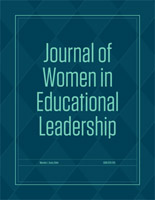Educational Administration, Department of

Journal of Women in Educational Leadership
Date of this Version
1-2008
Document Type
Article
Citation
Journal of Women in Educational Leadership, Vol. 6, No. I-January 2008 ISSN: 1541-6224
Abstract
Pearl Buck was not just an author of Chinese history; she was a pioneer in many ways. Born a child of Presbyterian missionaries, Buck spent most of her life in China (many times living in dangerous situations because of political uprisings). She wrote more than 70 books (essays, poetry, novels) during her life, and won a Pulitzer Prize (1932) and the Howells Medal (1935) for her second novel, The Good Earth (Conn, 1996). She was a philosophy major at Randolph-Macon Woman's College where she was very active in student government as an advisor of sorts to those who needed guidance (Abbot, 1992). She also won a Nobel Prize for Literature in 1938 (Encyclopedia Britannica, n.d.). In 1935, after 18 years of a rocky marriage, Buck divorced her first husband (Conn, 1996). Buck had one natural birth Carol, who was severely retarded and had to be institutionalized. During Carol's birth, doctors found a tumor in Buck's uterus; she had to have a complete hysterectomy (Conn, 1996). After marrying her second husband, Richard Walsh, she relocated to the United States permanently, and they adopted eight children (Lipscomb, Thoresen, & Webb, 2007). Buck was an advocate for women's rights as well as for minority children who were considered not adoptable. Buck established the Welcome House in 1949 in order to help these children find families (Conn, 1996). In 1964, she founded the Pearl S. Buck Foundation, now Pearl S. Buck International, which continues her commitment to promoting humanitarianism and fighting discrimination, especially toward mixed-raced children (Pearl S. Buck International [PSBI], 2007). In that way, she was a pioneer in bringing attention to the plight of the world's "outcast" children. Buck wrote ground-breaking stories about the Chinese people and culture, and she spent many difficult, politically-fueled, dangerous years in China. She divorced in a time when divorce wasn't in vogue, and she remarried shortly thereafter. Even though her literary works gained her the fame she enjoyed throughout her adult life, the foundation bears her name and carries on her legacy for which she will always be remembered. Buck is truly a leader, and a role model, even today for young women who struggle with who they are. Buck discovered who she was in both of her countries and used her knowledge and strength to change the lives of millions.


Comments
Copyright © 2008 Pro>Active Publications. Used by permission.